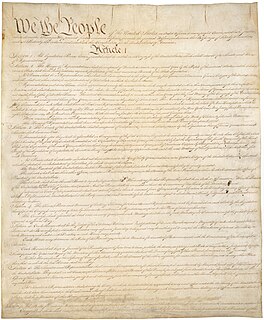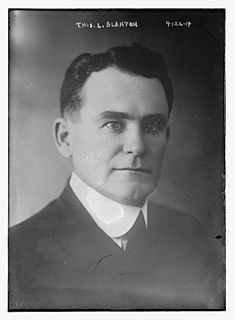The United States Constitution (Article 1, Section 5) [1] gives the House of Representatives the power to expel any member by a two-thirds vote. Expulsion of a Representative is rare: only five members of the House have been expelled in its history, all of whom were members of the Democratic Party. Three of those five were expelled in 1861 for joining the Confederate States of America. [2]

The United States Constitution is the supreme law of the United States. The Constitution, originally comprising seven articles, delineates the national frame of government. Its first three articles embody the doctrine of the separation of powers, whereby the federal government is divided into three branches: the legislative, consisting of the bicameral Congress ; the executive, consisting of the President ; and the judicial, consisting of the Supreme Court and other federal courts. Articles Four, Five and Six embody concepts of federalism, describing the rights and responsibilities of state governments, the states in relationship to the federal government, and the shared process of constitutional amendment. Article Seven establishes the procedure subsequently used by the thirteen States to ratify it. It is regarded as the oldest written and codified national constitution in force.

The United States House of Representatives is the lower chamber of the United States Congress, the Senate being the upper chamber. Together they compose the legislature of the United States.

The Democratic Party is one of the two major contemporary political parties in the United States, along with the Republican Party. Tracing its heritage back to Thomas Jefferson and James Madison's Democratic-Republican Party, the modern-day Democratic Party was founded around 1828 by supporters of Andrew Jackson, making it the world's oldest active political party.
Contents
- Expelled Representatives
- Censured Representatives
- Reprimanded Representatives
- Excluded Representatives-elect
- See also
- References
However, the House has other, less severe measures with which to discipline members. Censure and reprimand are procedures in which the House may vote to express formal disapproval of a member's conduct. Only a simple majority vote is required. Members who are censured must stand in the well of the House chamber to receive a reading of the censure resolution. [2] A reprimand was once considered synonymous with censure, but in 1976 the House defined a reprimand as a less severe punishment. Members who are reprimanded are not required to stand in the well of the house and have the resolution read to them.












